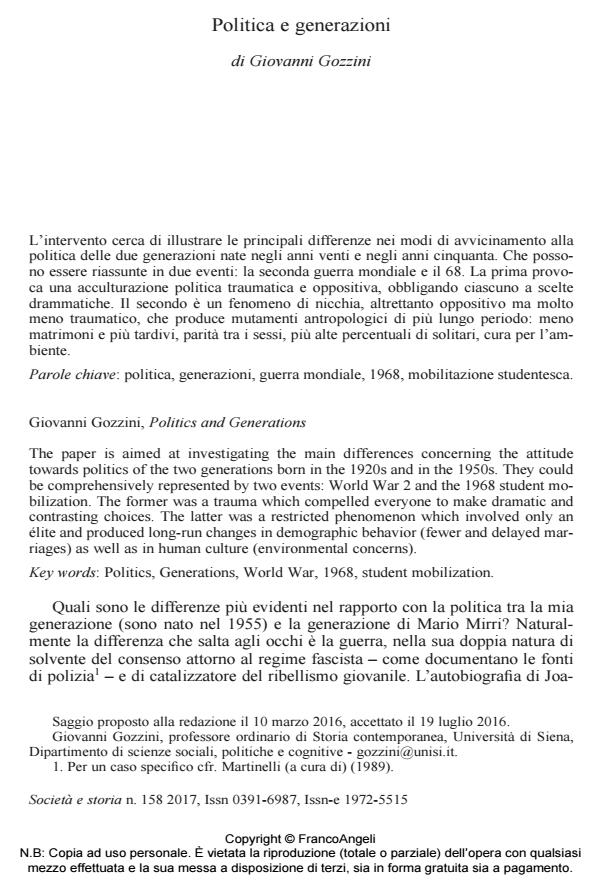Politics and Generations
Journal title SOCIETÀ E STORIA
Author/s Giovanni Gozzini
Publishing Year 2018 Issue 2017/158 Language Italian
Pages 6 P. 705-710 File size 26 KB
DOI 10.3280/SS2017-158008
DOI is like a bar code for intellectual property: to have more infomation
click here
Below, you can see the article first page
If you want to buy this article in PDF format, you can do it, following the instructions to buy download credits

FrancoAngeli is member of Publishers International Linking Association, Inc (PILA), a not-for-profit association which run the CrossRef service enabling links to and from online scholarly content.
The paper is aimed at investigating the main differences concerning the attitude towards politics of the two generations born in the 1920s and in the 1950s. They could be comprehensively represented by two events: World War 2 and the 1968 student mobilization. The former was a trauma which compelled everyone to make dramatic and contrasting choices. The latter was a restricted phenomenon which involved only an élite and produced long-run changes in demographic behavior (fewer and delayed marriages) as well as in human culture (environmental concerns).
Keywords: Politics, Generations, World War, 1968, student mobilization.
- Avagliano M., Palmieri M. (a cura di) (2009), Gli internati militari italiani. Diari e lettere dai lager nazisti 1943-1945, Torino, Einaudi.
- Bagnasco A. (1977), Tre Italie. La problematica territoriale dello sviluppo italiano, Bologna, il Mulino.
- Barro R.J., Lee J.W. (2000), International Data on Educational Attainment: Updates and Implications,
- Working Paper 42, Cambridge MA, Center for International Development-Harvard University.
- Bauman, Z. (2002), Modernità liquida, Roma-Bari, Laterza [Cambridge 2000].
- Cobalti A., Schizzerotto A. (1994), La mobilità sociale in Italia, Bologna, il Mulino.
- Dragoni U. (1996), La scelta degli IMI. Internati militari italiani in Germania 1943-1945, Firenze, Le Lettere.
- Fest J. (2007), Io no. Ricordi d’infanzia e di gioventù, Milano, Garzanti.[Berlin 2006]
- Ginsborg P. (1998), L’Italia del tempo presente. Famiglia, società civile, Stato. Torino, Einaudi.
- Gozzini G. (2011), La mutazione individualista. Gli italiani e la televisione 1955-2011, Laterza, Roma-Bari.
- Hirschman A.O. (1983), Felicità privata e felicità pubblica, Bologna, il Mulino [Princeton 1982]
- Judt T. (2007), Dopoguerra. Come è cambiata l’Europa dal 1945 ad oggi, Milano, Mondadori [London 2005].
- La Valle D. (2009), È cresciuta la società civile?, in R. Catanzaro-G. Sciortino (a cura di), La fatica di cambiare. Rapporto sulla società italiana, Bologna, il Mulino.
- Macunovich D.T. (2002), Birth quake: the baby boom and its aftershocks, Chicago, Chicago University Press.
- Martinelli R. (a cura di) (1989), Il fronte interno a Firenze 1940-1943. Lo spirito pubblico nelle “informazioni fiduciarie” della polizia politica, Firenze, Università di Firenze-Dipartimento di Storia.
- Mitchell B.R. (2003-2007), International Historical Statistics, New York, Palgrave MacMillan.
- Pintor G. (1965), Il sangue d’Europa 1939-1943, Torino, Einaudi.
- Sonnino E. ( 1995), La popolazione italiana dall’espansione al contenimento, in Storia dell’Italia repubblicana, v. 2, tomo 1, Torino, Einaudi.
Giovanni Gozzini, Politica e generazioni in "SOCIETÀ E STORIA " 158/2017, pp 705-710, DOI: 10.3280/SS2017-158008